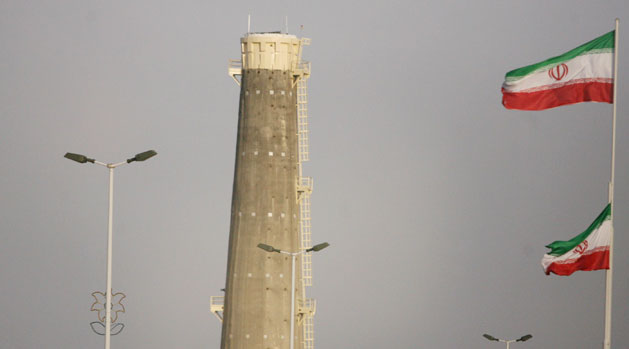Saudi Arabia threatens to match Iran's nuclear capabilities
'Whatever the Iranians have, we will have, too,' Saudi prince warns ahead of impending nuclear deal

A free daily email with the biggest news stories of the day – and the best features from TheWeek.com
You are now subscribed
Your newsletter sign-up was successful
Saudi Arabia has promised to match the nuclear enrichment capabilities Iran is allowed under a possible deal with the West, raising fears of a regional arms race.
"Whatever the Iranians have, we will have, too," Saudi Prince Turki bin Faisal, the 70-year-old former intelligence chief, said at a recent conference.
The controversial agreement over Iran's nuclear weapons programme is expected to be signed soon, though its success is still far from guaranteed.
The Week
Escape your echo chamber. Get the facts behind the news, plus analysis from multiple perspectives.

Sign up for The Week's Free Newsletters
From our morning news briefing to a weekly Good News Newsletter, get the best of The Week delivered directly to your inbox.
From our morning news briefing to a weekly Good News Newsletter, get the best of The Week delivered directly to your inbox.
The six Arab powers of the Gulf Cooperation Council (GCC), Saudi Arabia, the United Arab Emirates, Kuwait, Bahrain, Qatar and Oman, are at a summit in the US, where Obama will attempt to reassure leaders that their security concerns are taken into account.
Saudi King Salman pulled out of the talks at the last minute, sending the crown prince instead, and although officials said the king had decided to remain in Riyadh to focus on the five-day ceasefire in Yemen, it has been interpreted by many as a deliberate snub over the Iran deal.
Saudi Arabia isn't alone in its desire to match Iran's nuclear capabilities. "Many of the smaller Arab states are now vowing to match whatever nuclear enrichment capability Iran is permitted to retain," says the New York Times.
"We can't sit back and be nowhere as Iran is allowed to retain much of its capability and amass its research," said one Arab leader ahead of the conference.
A free daily email with the biggest news stories of the day – and the best features from TheWeek.com
Obama's former nuclear advisor, Gary Samore, said a race was inevitable. "With or without a deal, there will be pressure for nuclear proliferation in the Middle East," he said "The question is one of capabilities. How would Saudis do this without help from the outside?"
The Times suggests that the kingdom might be forced to turn to Pakistan or North Korea to secure nuclear components. Although a deal with North Korea is highly unlikely, "it is widely presumed that Pakistan would provide Saudi Arabia with the technology, if not a weapon itself," says the newspaper.
-
 Sepsis ‘breakthrough’: the world’s first targeted treatment?
Sepsis ‘breakthrough’: the world’s first targeted treatment?The Explainer New drug could reverse effects of sepsis, rather than trying to treat infection with antibiotics
-
 James Van Der Beek obituary: fresh-faced Dawson’s Creek star
James Van Der Beek obituary: fresh-faced Dawson’s Creek starIn The Spotlight Van Der Beek fronted one of the most successful teen dramas of the 90s – but his Dawson fame proved a double-edged sword
-
 Is Andrew’s arrest the end for the monarchy?
Is Andrew’s arrest the end for the monarchy?Today's Big Question The King has distanced the Royal Family from his disgraced brother but a ‘fit of revolutionary disgust’ could still wipe them out
-
 Will increasing tensions with Iran boil over into war?
Will increasing tensions with Iran boil over into war?Today’s Big Question President Donald Trump has recently been threatening the country
-
 US, Russia restart military dialogue as treaty ends
US, Russia restart military dialogue as treaty endsSpeed Read New START was the last remaining nuclear arms treaty between the countries
-
 What happens now that the US-Russia nuclear treaty is expiring?
What happens now that the US-Russia nuclear treaty is expiring?TODAY’S BIG QUESTION Weapons experts worry that the end of the New START treaty marks the beginning of a 21st-century atomic arms race
-
 Epstein files topple law CEO, roil UK government
Epstein files topple law CEO, roil UK governmentSpeed Read Peter Mandelson, Britain’s former ambassador to the US, is caught up in the scandal
-
 Iran and US prepare to meet after skirmishes
Iran and US prepare to meet after skirmishesSpeed Read The incident comes amid heightened tensions in the Middle East
-
 Which way will Trump go on Iran?
Which way will Trump go on Iran?Today’s Big Question Diplomatic talks set to be held in Turkey on Friday, but failure to reach an agreement could have ‘terrible’ global ramifications
-
 Israel retrieves final hostage’s body from Gaza
Israel retrieves final hostage’s body from GazaSpeed Read The 24-year-old police officer was killed during the initial Hamas attack
-
 China’s Xi targets top general in growing purge
China’s Xi targets top general in growing purgeSpeed Read Zhang Youxia is being investigated over ‘grave violations’ of the law